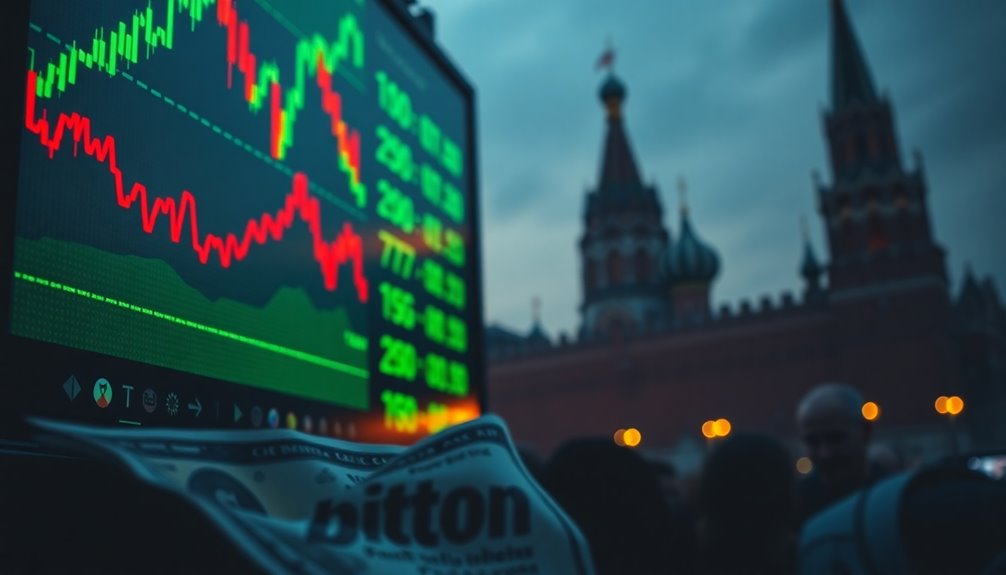Putin's move to legalize Bitcoin for international payments could indeed challenge the dollar's supremacy. As economies face sanctions and inflation, many nations might see Bitcoin as a safer alternative. Russia's regulatory framework aims to stabilize its economy and diversify away from the dollar, allowing cryptocurrencies to act as a means to bypass traditional financial systems. This shift signifies growing public adoption and institutional support, potentially reshaping global financial norms. With rising tensions and waning confidence in the dollar, the stakes are high for the future of global currency dynamics. Stay tuned to uncover how this unfolds. However, Putin’s Bitcoin move against dollar dominance could also prompt other nations to evaluate similar strategies, sparking a broader shift in international payment systems. This adoption of decentralized financial tools might accelerate the decline of dollar hegemony, forcing a reimagining of global economic alliances. The impact of such a transition could usher in a new era of financial independence for sanctioned and developing countries alike.
Key Takeaways
- Putin's legalization of cryptocurrency for international payments allows Russia to circumvent sanctions, increasing Bitcoin's strategic importance.
- Bitcoin's rising value during geopolitical crises positions it as a potential alternative to the dollar in global trade.
- The growing adoption of Bitcoin among countries in crisis indicates a shift away from reliance on traditional currencies like the dollar.
- Institutional support for Bitcoin through ETFs reflects confidence in its potential to serve as a reserve asset, challenging the dollar's dominance.
- The dollar's declining appeal due to inflation and national debt creates an opening for cryptocurrencies to reshape global financial norms.
Strategic Shift in Russia's Economy

Amidst the tightening grip of international sanctions, Russia's economy is undergoing a strategic shift that could redefine its financial landscape. In 2022, the sanctions caused a 2.1% drop in GDP, and forecasts suggest further declines of 2.5% according to the OECD, or just 0.2% from the World Bank in 2023. Meanwhile, imports plummeted by over 15%, while exports fell by nearly 9%. This economic strain is exacerbated by a staggering drop in oil revenues, which fell over 26% in January 2023 compared to the previous year. To counter these challenges, President Putin is championing de-dollarization, urging a shift towards local currencies in trade, especially among BRICS nations. However, this effort faces hurdles, particularly with Russia being locked out of the SWIFT system, which complicates international transactions. The freezing of around €300 billion in Central Bank reserves intensifies these financial restrictions, limiting access to global markets. As the government explores alternative payment systems, the urgency for diversification becomes evident. Bitcoin's decentralized nature offers Russia a potential solution as it navigates through these economic challenges. In this shifting terrain, you can expect a profound transformation in how Russia navigates its economic future. This transformation is further shaped by global economic trends, including America’s loose economy and bitcoin, which present both challenges and opportunities for Russia. As the U.S. continues to grapple with inflation and monetary policy shifts, the decentralized appeal of cryptocurrencies like Bitcoin aligns with Russia’s push to bypass traditional financial mechanisms. By leveraging blockchain technology and fostering crypto adoption, Russia aims to create new pathways for trade and mitigate the economic pressures stemming from ongoing sanctions.
Legislative Changes Impacting Crypto

Recognizing the need for economic resilience, Russia is implementing significant legislative changes that reshape its cryptocurrency landscape. Effective November 2024, these new laws pave the way for a regulated and monitored crypto environment.
Here are some key aspects of the legislative changes:
- Mining Legality: Entities registered in a state database can mine cryptocurrency, while individuals must comply with energy consumption limits.
- Regulatory Oversight: The Central Bank of Russia (CBR) will closely monitor crypto transactions, including cross-border payments, ensuring compliance with regulations.
- Tax Responsibilities: Although crypto mining is exempt from VAT, miners must report their mined totals and provide specific crypto addresses to the tax service.
- Cross-Border Usage: Laws allowing cryptocurrency for international payments start in September 2024, aiming to reduce reliance on the U.S. dollar. This initiative aligns with the CBR's leadership in integrating cryptocurrency for international trade to mitigate sanctions impact.
These legislative changes are designed to create a controlled framework for cryptocurrency operations, enhancing Russia's economic autonomy while addressing concerns related to illicit activities and financial transparency.
The shift represents an essential step in redefining the country's position in the global financial landscape.
Economic Implications of Cryptocurrency

Cryptocurrency is shaking up the economic landscape in ways that traditional currencies can't match. While the market size is rapidly growing, valued at USD 5.08 billion in 2023 and projected to reach USD 15.39 billion by 2032, the current design of cryptocurrencies like Bitcoin still results in significant inefficiencies.
Right now, Bitcoin's scheme generates a welfare loss of 1.4% of consumption, but a more efficient design could reduce that to just 0.08%. This inefficiency is partly due to the high costs associated with mining, which are 500 times greater than those of traditional currencies in low-inflation environments. Additionally, AI-driven personalization can optimize financial education for investors, helping them make more informed decisions in the cryptocurrency market.
However, the rise of decentralized finance (DeFi) is pushing the boundaries of how you engage with financial systems. More Americans are investing, with ownership rising to 40%, driven by institutional adoption from companies like Tesla. Additionally, the total value locked (TVL) in DeFi platforms exceeded USD 100 billion in 2023, highlighting the growing interest in decentralized financial solutions.
Plus, blockchain technology enhances security and reduces fraud, allowing for peer-to-peer transactions without intermediaries. If cryptocurrencies can improve their designs, they stand to challenge traditional payment systems, improving both efficiency and social welfare while integrating further into everyday financial transactions.
Geopolitical Landscape and Bitcoin

The rapid growth of cryptocurrency isn't just reshaping financial systems; it's also altering the geopolitical landscape. As countries navigate complex sanctions and economic pressures, Bitcoin emerges as a strategic tool. Here's how it's changing the game:
- Sanctions Bypass: Bitcoin offers states under sanctions a means to conduct international transactions without interference. Its decentralized nature allows for borderless exchanges, making it difficult to freeze or seize assets. This capability has been leveraged by nations such as Iran and North Korea to circumvent traditional financial systems.
- Geopolitical Tensions: During crises like Brexit or US-China trade wars, Bitcoin's value tends to rise, acting as a "digital gold" and safe haven for investors seeking stability.
- Russia's Policy Shift: In response to Western sanctions, Russia has enacted laws to legalize cryptocurrency usage for international payments, a significant turn from its previous ban stance.
- Statecraft Tool: Nations are increasingly using Bitcoin as a strategic asset to maintain economic continuity, providing discretion in international dealings while reducing reliance on traditional reserve currencies.
As these dynamics unfold, the role of Bitcoin in geopolitics will likely grow, challenging established financial norms and potentially reshaping global power structures.
Decentralization: A New Financial Frontier

As you explore decentralization, you'll notice it's not just about technology; it's a shift toward financial independence. By removing centralized authorities, you gain resistance against political interference, allowing you to control your own assets. This new frontier empowers individuals, redefining how you interact with money and financial systems. Additionally, DeFi protocols provide a means for peer-to-peer transactions, further enhancing your autonomy in financial dealings.
Financial Independence Revolution
Decentralization is reshaping the financial landscape, empowering individuals to take control of their financial destinies. The rise of decentralized finance (DeFi) is fostering a financial independence revolution, offering you new opportunities to manage and grow your wealth.
Here are some key benefits you can expect from this shift:
- Democratization of Finance: With DeFi, financial services become accessible to everyone, allowing broader participation in economic activities, similar to how machine learning enables systems to learn and adapt based on user interactions. This shift is akin to the way indexed annuities provide market-related returns, offering individuals more control over their investments. Additionally, alternative investments like cryptocurrencies provide avenues for diversifying one's portfolio in this new financial era. Furthermore, blockchain technology ensures secure and transparent transactions, fostering trust among users.
- Efficient and Faster Transactions: Enjoy swift transactions without intermediaries, minimizing errors and delays. Smart contracts automate agreements, making transactions even more efficient.
- Reduced Costs: Say goodbye to high fees and charges from traditional banks, as DeFi automates processes to lower operational costs.
- Increased Security and Privacy: Protect your digital assets with blockchain technology that prevents data tampering and guarantees full ownership.
As you explore this new financial frontier, you'll find that decentralized applications (dApps) and cryptocurrencies enhance your ability to transact directly with others.
The financial independence revolution is here, and it's redefining how you manage your money. Embrace this change, and take charge of your financial future today!
Political Interference Resistance
Emerging from a landscape where financial independence flourishes, the potential for decentralization to resist political interference is becoming clearer. You might already know that cryptocurrencies like Bitcoin have been used in election interference, particularly by Russia's GRU to fund covert operations. This highlights how centralized systems can be exploited for political gain.
However, decentralized finance (DeFi) platforms offer a counterbalance, enabling peer-to-peer transactions that bypass traditional financial systems entirely. With DeFi, you can borrow and lend without needing credit checks, which is a game-changer for the unbanked. This shift from centralized control to decentralized systems allows for greater financial autonomy, reducing the effectiveness of political interference. Political resistance can be bolstered through decentralized finance, as it empowers individuals to take action against injustices without relying on traditional financial institutions.
As more people embrace blockchain technology, trustless collaboration can streamline inefficiencies in supply chains and create a more resilient economy.
Globally, nations like Russia are adopting cryptocurrencies to counter sanctions and lessen dependence on the U.S. dollar. As Putin pushes for digital currency development, it underscores that decentralization isn't just a financial trend; it's a strategic move to gain political and economic independence from traditional powers.
Public Adoption of Cryptocurrency

With a growing number of individuals turning to cryptocurrency, public adoption is rapidly reshaping financial landscapes worldwide. You might be surprised to learn that a significant portion of crypto investors are Millennials, with 57% belonging to this age group. In contrast, only 13% are from Gen Z, highlighting a generational divide.
Here's a snapshot of the current demographic trends:
- Gender Distribution: Over 62% of crypto investors are male, leaving 38% as female.
- Education: A staggering 71% of crypto owners hold a Bachelor's degree or higher.
- Income Levels: 36% of crypto owners earn $100,000 or more annually.
- Global Reach: Countries like India lead in Bitcoin adoption, with 75 million users, followed by China and the USA.
This demographic shift is propelled by various factors, including economic instability and a lack of banking access in emerging markets. A notable trend is that countries facing financial crises often turn to Bitcoin for stability, further increasing its adoption.
People are increasingly using cryptocurrency not just for investment, but also for transactions, especially in regions where traditional banking services are limited.
The trend shows no signs of slowing, reinforcing the potential of crypto to transform global finance.
Market Statistics and Trends

Market statistics and trends regularly reveal the dynamic nature of cryptocurrency, particularly Bitcoin. Analysts are bullish, predicting Bitcoin could reach $100,000 by year-end, driven by strong sentiment and historical patterns.
Institutional support is growing, with record inflows into spot Bitcoin ETFs fueling this momentum. As pro-crypto regulations loom, the market anticipates further positive shifts.
Bitcoin recently hit a new all-time high of $93,495, boasting a near 30% gain. For December 2024, the expected trading range is between $95,440.78 and $107,264.36, with an average forecasted price around $101,352.57. Additionally, open interest across major crypto exchanges is at record highs, indicating increased market participation.
Looking into January 2025, projections suggest a minimum price of $102,807.03 and a maximum of $109,845.40.
However, keep in mind the volatility associated with high leverage ratios, which could lead to corrections. While the outlook remains optimistic, these factors could impact short-term price movements.
Additionally, broader economic conditions, including interest rate cuts and inflation rates, continue to shape Bitcoin's appeal. As you navigate this rapidly changing landscape, staying informed about these trends will be essential for your investment decisions.
Technological Developments in Crypto

Technological advancements in the cryptocurrency space are rapidly reshaping how we interact with digital assets. As we move through 2024, several key developments stand out:
- Scalability Solutions: Layer 2 (L2) scaling solutions are addressing throughput issues, allowing for increased transactions while maintaining security. Additionally, the development of zero-knowledge rollups has significantly improved transaction privacy and efficiency on platforms like Ethereum.
- Cross-Chain Interoperability: The need for seamless asset transfer across multiple blockchains is vital. LayerZero has enabled billions in transactions, while the Cosmos Network's Inter-Blockchain Communication (IBC) protocol is now utilized by over 50 blockchains, up 30% from last year.
- Smart Contract Innovations: Self-executing contracts are becoming more robust with upgradability features and AI-generated optimizations. These advancements enhance security and reduce human error in financial transactions.
- AI and Blockchain Integration: The merging of AI with blockchain is paving the way for adaptive smart contracts. AI tools adjust algorithms based on real-time data, greatly improving efficiency in sectors like finance and supply chain management.
These developments are setting the stage for a more efficient and interconnected crypto landscape.
Future Outlook for the Dollar

The future outlook for the dollar is increasingly uncertain as various economic and geopolitical factors come into play. With U.S. economic growth slowing and interest rates being cut, the dollar's attractiveness diminishes. If you consider the impact of geopolitical tensions, especially with Russia's shift toward Bitcoin as a global reserve asset, it becomes clear that the dollar's dominance is at risk.
Here's a snapshot of the factors influencing the dollar's future:
| Factor | Current Status | Potential Impact |
|---|---|---|
| Economic Growth | Slowing compared to other nations | Reduced confidence in dollar |
| Interest Rates | Recent cuts narrowing yield gap | Less foreign investment |
| Geopolitical Tensions | Rising, especially with Russia | Shift to alternative currencies |
As confidence wanes, capital flight may occur, leading to a rapid sell-off of dollar-denominated assets. With rising inflation and high debt levels, you might see a self-reinforcing cycle where the dollar's value continues to decline. This instability could prompt central banks to seek alternatives, further challenging the dollar's status as the world's reserve currency. The future looks precarious, and the implications could be far-reaching.
Frequently Asked Questions
How Will Russia's Bitcoin Strategy Affect Global Cryptocurrency Regulations?
Russia's Bitcoin strategy is likely to push you and other nations to rethink their cryptocurrency regulations.
As Russia embraces crypto, you'll see increased pressure for standardization and cooperation among countries. This could lead to clearer frameworks, making it easier for you to navigate the market.
Ultimately, as regulations evolve globally, you might find cryptocurrencies becoming more mainstream, which could reshape how you engage in international trade and finance.
What Challenges Might Russia Face in Implementing Crypto Payment Trials?
When implementing crypto payment trials, you'll face several challenges.
Regulatory obstacles will require tight monitoring and the development of new frameworks.
Infrastructure needs adapting to handle complex transactions, and ensuring security is essential.
Economic fluctuations can impact stability, complicating cross-border payments.
Additionally, maneuvering international sanctions and building partnerships with other nations are important.
Addressing these hurdles will be key to successfully integrating cryptocurrency into Russia's financial landscape.
Can Other Countries Follow Russia's Lead With Bitcoin?
Think of Russia's move towards Bitcoin as a seed planted in a garden; it could inspire others to cultivate their own crypto policies.
Yes, other countries can follow suit, especially if they see the potential for bypassing sanctions or boosting their economies.
With the right regulatory frameworks and incentives, nations might embrace cryptocurrencies, creating a ripple effect that shifts global financial dynamics.
Each country's unique circumstances will dictate their approach, though.
How Might Russia's Bitcoin Policies Influence Investor Sentiment Globally?
Russia's Bitcoin policies could considerably influence global investor sentiment by fostering a perception of cryptocurrencies as legitimate and stable investment options.
As you see other countries potentially adopting similar strategies, you might become more inclined to explore digital assets yourself.
Increased trading activity could arise from the volatility created by geopolitical tensions, pushing you to reassess your risk tolerance and investment strategy in light of these shifting dynamics in the financial landscape.
What Are the Implications for Traditional Banking Systems in Russia?
The implications for traditional banking systems in Russia are significant.
As banks begin to offer crypto-linked services, you'll notice a shift in how transactions are processed. With regulations easing around crypto mining and sales, banks might find new revenue streams.
This integration could enhance cross-border payments and reduce reliance on Western financial systems, giving you more options but also raising concerns about security and oversight in the evolving financial landscape.
Conclusion
As Russia pivots toward Bitcoin, the stakes for the dollar grow higher. You can feel the tension building in the global economy—will this bold move shift the balance of power forever? With legislative changes and public interest surging, the implications could be monumental. Are you ready for a financial landscape where crypto reigns supreme? The world watches closely as the dominoes begin to fall. What happens next could change everything you thought you knew about money.









